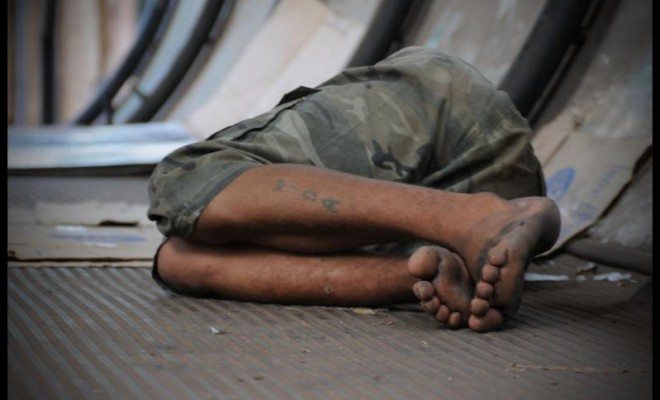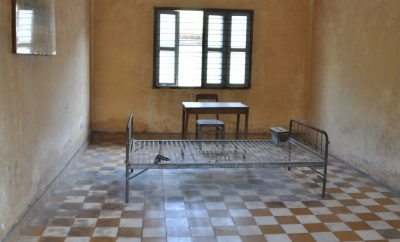 Image courtesy of [Sebastian via Flickr]
Image courtesy of [Sebastian via Flickr]
Law
Justice Department Pushes Against Criminalizing Homelessness
A relatively minor case in Boise, Idaho may have some significant implications for many cities across the United States. Last week, the Justice Department (DOJ) filed a Statement of Interest in a Boise lawsuit against the city’s ordinances that ban sleeping and camping in public space. According to the Justice Department, rendering it illegal for people to sleep outside when there is not enough room in homeless shelters constitutes a violation of the Eighth Amendment, which protects people from cruel and unusual punishment. Not only does the DOJ claim that having these laws when no other option exists is unconstitutional, it also notes that they are largely ineffective–making matters worse for both homeless people and the communities that they live in.
The case that the DOJ is addressing is Bell v. City of Boise, which was filed by several homeless people in 2009 after they were convicted under ordinances that make public camping and sleeping illegal. Ordinances like the one in Boise are actually quite common–a study by the National Law Center on Homelessness and Poverty, which surveyed 187 U.S. cities, found that 34 percent of the cities had citywide bans on camping in public and 18 percent ban sleeping in public. The report also notes that there are frequently not enough beds in many cities to provide shelter for all of the city’s homeless. This is the problem that the Department of Justice addresses directly in its Statement of Interest–arguing that when beds are unavailable, homeless people should not be arrested for doing something required for survival.
Shortly after the DOJ filed its Statement of Interest, Mike Journee, a spokesman for the mayor, fired back claiming, “the premise of the filing is incorrect.” Journee argued that homeless people in the city almost always have resources available to them, and in extreme situations, like severe weather, the city’s ordinances prevent police from issuing tickets.
But Journee’s response largely misses the point of the filing. The DOJ’s statement was not intended to weigh in on the facts of the case, rather it urged the court to evaluate the law using a particular logic. The statement referenced a Los Angeles case from 2006, which called a similar law into question. That case, Jones v. The City of Los Angeles, focused on whether the city’s homeless had alternatives to sleeping in public spaces. The DOJ is not arguing that the ordinance in Bosie is unconstitutional on its face, rather it is saying that it should be considered unconstitutional if people are convicted for sleeping outside when that is the only available option–effectively criminalizing the condition of homelessness.
Beyond recommending the appropriate logic to evaluate the Bell case, the Department of Justice’s statement highlights many of the potential issues related to laws that tend to punish homeless people. Arresting people for sleeping outside, when no alternatives exist, simply serves to further perpetuate the condition of homelessness. Having a criminal record makes it very difficult for someone to get a job or participate in a public housing program. Even more to the point, in many cases criminalizing homelessness actually costs cities more money than simply providing housing. The Statement of Interest concludes,
Thus, criminalizing homelessness is both unconstitutional and misguided public policy, leading to worse outcomes for people who are homeless and for their communities.
Alternatives to punishing homelessness do exist, and in many cases they have been effective. In Utah, the government started providing housing, counseling, and treatment to the homeless population in 2005. Since then, the number of chronically homeless people in the state has decreased by more than 70 percent. Not only has this effort changed a significant number of lives, it also saved the state a considerable amount of money. Between hospitalization, medical treatment, incarceration, and shelters, governments end up spending a lot of money on the homeless each year, but that spending typically does not address the underlying issues. A similar “housing first” program in Seattle, found that providing houses to the homeless saved the city 53 percent per person. In Los Angeles, placing just four homeless people in permanent supportive housing saved the city $80,000 per year.
The Department of Justice’s recent statement may cause governments to question whether policies that punish the homeless are worthwhile. Although the DOJ did not weigh in on the specific facts of the Boise case, it did recommend a better way of evaluating laws that ban camping and sleeping in public. The Statement of Interest argues that criminalizing the condition of homelessness is unconstitutional and a violation of the Eight Amendment and future cases should be evaluated with that logic. In light of this argument and the availability of successful alternatives, governments may want to focus their money and policies on alleviating homelessness, not punishing it.








Comments